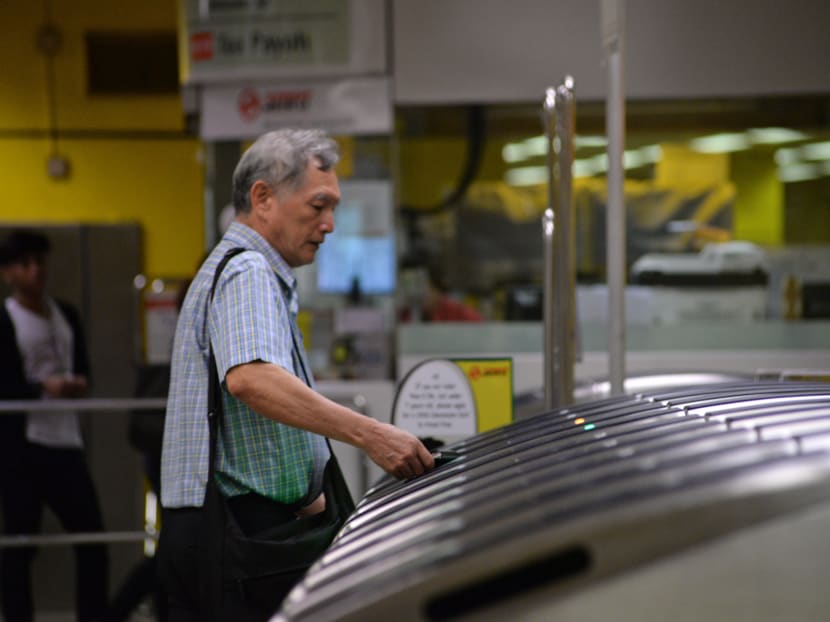A cashless transit won’t be easy for some elderly and the young, say observers
SINGAPORE — With the bulk of top-ups of fare cards still paid by cash, the shift to a cashless public transport system could affect groups such as senior citizens and young school-going children, said observers.
SINGAPORE — With the bulk of top-ups of fare cards still paid by cash, the shift to a cashless public transport system could affect groups such as senior citizens and young school-going children, said observers.
Commuters that TODAY spoke to also expressed worries, while transport analysts felt incentives could be offered to ease the transition for elderly commuters. They were responding to the announcement by the Land Transport Authority (LTA) and TransitLink on Friday that transactions across the public transport system would go cashless by 2020.
In June, 69 per cent of top-up transactions were made using cash, said the LTA. Around half of these were carried out through general ticketing machines.
Thirty-one per cent of transactions were cashless, and the majority were paid using NETS cards.
Cashless payments are a sign of the times and Singapore has to catch up with countries such as China, noted Singapore University of Social Sciences (SUSS) urban transport expert Park Byung Joon.
But challenges are rife for the elderly, said Member of Parliament (MacPherson) Tin Pei Ling. “There are some elderly who rely on cash as their sole mode of payment. Some of the elderly whom I’ve spoken with either don’t trust or don’t use simple card functions like ATM cards or credit cards. Some of them might not even have credit cards because they don’t have that much savings to begin with,” she said.
Low-income seniors might not even have bank accounts, as most banks require a minimum deposit amount, said Singapore Management University transport expert Terence Fan.
Retired cleaner Lim Soi Lek said she would be lost and inconvenienced by a cashless public transport system. The 80-year-old, who only speaks the Teochew dialect, has never owned a debit or credit card, and does not know how to sign up for one.
Parents of young commuters also had reservations over a cashless public transport system. Mother-of-two Melinda Chung, said she wanted oversight of the amounts spent by her children, aged 11 and 15, using their transit cards. “I don’t want to give my children access to anyhow top up. They (may) top up more and (use their EZ-Link cards to) pay for (items other than transport) elsewhere,” said Ms Chung, 48.
The LTA and TransitLink — a subsidiary of LTA that processes transit transactions and provides card sales and top-ups of stored value smartcards — said cash alternatives would remain. “Even as we work towards cashless transactions within the public transport system, (we) will ensure that cash alternatives to paying for public transport rides, such as for the sale and top-up of stored-value cards, are available nearby, for example, at convenience stores,” they stated in a press release.
National University of Singapore transport researcher Lee Der-Horng suggested making top-up services available at supermarkets, while SUSS economist Walter Theseira called for guidelines on cash alternatives “to ensure accessibility”.
“Such guidelines may require that a convenience store which accepts cash for transit services be located within a minimum distance from the control station, and that the store is open during all station operating hours and is accessible to customers with disabilities,” said Dr Theseira. Station officers have to be trained to direct commuters to the store and signs will need to be put up, he added.
Station officers could also be authorised to allow commuters with insufficient funds for cashless payments or top-ups to ride first and pay later, he said. To prevent commuters from taking advantage of such leeway given, station officers could take down information such as the commuters’ identity card numbers, he said.
To make the transition less painful for some commuters, Member of Parliament (Ang Mo Kio) Ang Hin Kee suggested that rebates could be offered to get more elderly to try cashless methods. Nanyang Technological University senior research fellow Gopinath Menon proposed offering a temporary rebate to sweeten the transition for all commuters.
Incentives could spur the take-up of cashless payments, as Mr Veera Puthiran, 70, did a decade ago.
He had used cash to top up his EZ-Link card until his children showed him, twice, how to use an ATM card to do so.
“The initial stage was difficult. But for the sake of convenience, I caught up, and now I am used to it,” he said.









